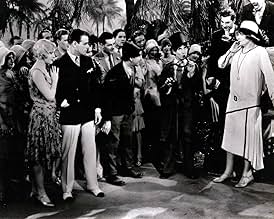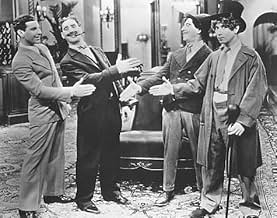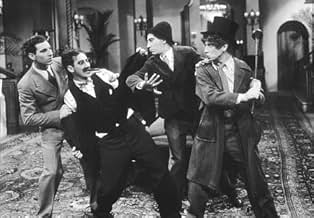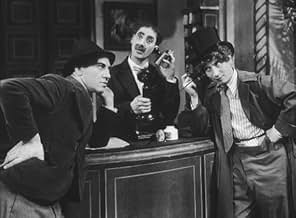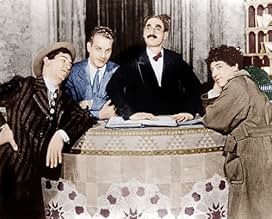IMDb रेटिंग
6.8/10
8.5 हज़ार
आपकी रेटिंग
अपनी भाषा में प्लॉट जोड़ेंDuring the Florida land boom, The Marx Brothers run a hotel, auction off some land, thwart a jewel robbery, and generally act like themselves.During the Florida land boom, The Marx Brothers run a hotel, auction off some land, thwart a jewel robbery, and generally act like themselves.During the Florida land boom, The Marx Brothers run a hotel, auction off some land, thwart a jewel robbery, and generally act like themselves.
- निर्देशक
- लेखक
- स्टार
- पुरस्कार
- 2 कुल नामांकन
Groucho Marx
- Hammer
- (as Marx Brothers)
Harpo Marx
- Harpo
- (as Marx brothers)
Chico Marx
- Chico
- (as Marx Brothers)
Zeppo Marx
- Jamison
- (as Marx Brothers)
Gamby-Hale Ballet Girls
- Dancers
- (as Gamby-Hale Girls)
Dolores Hope
- Dancer
- (बिना क्रेडिट के)
Sylvan Lee
- Bell Captain
- (बिना क्रेडिट के)
Barton MacLane
- Lifeguard
- (बिना क्रेडिट के)
फ़ीचर्ड समीक्षाएं
"The Coconuts", being the Marx Brothers' first film, is bound to be a little creaky. This does not mean you should miss it, however! Groucho delivers some of his most scathing one-liners, Harpo provides a perfect blend of devilry and sympathy, and Chico struts like a peacock. Even the fabulous Margaret Dumont gets in on the action, telling her warbling daughter to "stop singing on the beach at all hours" after one truly atrocious song. What brings this film down is bad editing and the godawful songs--Mary Eaton singing "Do the Monkey Doodle Do"--say WHAT!?!? The dancing is,as Groucho states, "A little entertainment--very little." And Harpo's harp solo was really just pasted in there. Stay away from the fast-forward button, though--the songs are just as laughable as the jokes(for all the wrong reasons, of course), as is Kay Francis's drag queen-esque performance. And don't miss the show-stopper "I want my shirt!" My sister and I were rolling on the ground laughing. The love couple is truly nauseating, but a touching moment is provided when the childlike Harpo comforts a heartbroken Mary Eaton. Full of vaudevillian jokes and biting one-liners, this is definitely a film no Marx Brothers fan should miss!
The creative talents of George S. Kaufman, Irving Berlin, and the Brothers Marx went into the production of the Broadway musical The Cocoanuts which ran for 216 shows in the 1925-1926 season. Of the talent involved it was the Marx Brothers who came out the winners.
George S. Kaufman was one of the great wits of the last century, but so were the Marx Brothers. They ad-libbed and eliminated much of Kaufman's well turned prose and things were pretty tense between him and the brothers on Broadway. He also did not like a certain song that Berlin wanted to use in The Cocoanuts and Berlin took it from the show after Kaufman ragged on him. The song was Always. The Cocoanuts was the first book musical that Irving Berlin ever wrote, he did mostly reviews before The Cocoanuts. It also is the only one without a single hit song from it.
But as a Marx Brothers comedy it made the Brothers reputations. The plot such as it is concerns the boom in Florida real estate in which a lot of people got wealthy and a lot lost their shirts, though not quite in the way Basil Ruysdael does when Harpo and Chico take it off his back while he's trying to frisk them in his duties as the house detective.
The Cocoanuts was shot at the Paramount Astoria studio in Queens and used a lot of Broadway performers in the roles. Besides the Brothers, only Margaret Dumont and Basil Ruysdael came over from the Broadway cast. But Oscar Shaw and Mary Eaton had well established reputations on Broadway. Kay Francis is in the cast as the bad girl and she certainly went on to a substantial Hollywood career.
The main thing The Cocoanuts has going for it besides the Marx Brothers is the fact it is a filmed record of a Twenties era Broadway musical. Paramount made very few concessions in adapting The Cocoanuts to the screen. What we see is filmed play. Historic, but I fear not as entertaining as the later work of the Marx Brothers.
George S. Kaufman was one of the great wits of the last century, but so were the Marx Brothers. They ad-libbed and eliminated much of Kaufman's well turned prose and things were pretty tense between him and the brothers on Broadway. He also did not like a certain song that Berlin wanted to use in The Cocoanuts and Berlin took it from the show after Kaufman ragged on him. The song was Always. The Cocoanuts was the first book musical that Irving Berlin ever wrote, he did mostly reviews before The Cocoanuts. It also is the only one without a single hit song from it.
But as a Marx Brothers comedy it made the Brothers reputations. The plot such as it is concerns the boom in Florida real estate in which a lot of people got wealthy and a lot lost their shirts, though not quite in the way Basil Ruysdael does when Harpo and Chico take it off his back while he's trying to frisk them in his duties as the house detective.
The Cocoanuts was shot at the Paramount Astoria studio in Queens and used a lot of Broadway performers in the roles. Besides the Brothers, only Margaret Dumont and Basil Ruysdael came over from the Broadway cast. But Oscar Shaw and Mary Eaton had well established reputations on Broadway. Kay Francis is in the cast as the bad girl and she certainly went on to a substantial Hollywood career.
The main thing The Cocoanuts has going for it besides the Marx Brothers is the fact it is a filmed record of a Twenties era Broadway musical. Paramount made very few concessions in adapting The Cocoanuts to the screen. What we see is filmed play. Historic, but I fear not as entertaining as the later work of the Marx Brothers.
A brilliant film debut by the Marx Brothers in this 1929 musical comedy (from Broadway) about land speculation in Florida, jewel thieves, and well the Marx Brothers. In their first film, all the familiar schtick and word play are already in place with Groucho, Chico, and Harpo all excellent.
As usual there is also a romantic young couple--Mary Eaton and Oscar Shaw--and bad guys--Kay Francis and Cyril Ring. Also making her film debut at age 40 is the wonderful and imperious Margaret Dumont. Basil Ruysdael plays the house detective. Zeppo Marx plays the desk clerk.
A blah ballad is sung to death, but The Monkey Doodle-Doo song is terrific and well sung and danced by Eaton (a Broadway star) and chorus. Oddly staged productions number with chorus in monkey suits and tourists milling about in the background. But Eaton is quite good, considering the early sound equipment. And she has great legs.
Francis is fun in her second film (she made five in 1929) but teamed with the unappealing Ring. Shaw is OK but seems too old to be playing the juvenile lead.
But while Dumont, Francis, and Eaton are fun, it's the 3 brothers who dominate the film. Several classic bits, including the viaduct gag, Chico's great piano solo, Harpo getting to steal a few scenes, and of course Groucho riding roughshod over everyone. What a treat! While Kay Francis went on to major stardom in the 30s, Mary Eaton made one disastrous film after this hit, Flo Ziegfeld's Glorifying the American Girl. That ended her starring career in Hollywood.
The more I watch the Marx Brothers the more I appreciate Chico, who was always my least favorite of the 3. Now I notice his perfect comic timing and I just love his piano solos.
As usual there is also a romantic young couple--Mary Eaton and Oscar Shaw--and bad guys--Kay Francis and Cyril Ring. Also making her film debut at age 40 is the wonderful and imperious Margaret Dumont. Basil Ruysdael plays the house detective. Zeppo Marx plays the desk clerk.
A blah ballad is sung to death, but The Monkey Doodle-Doo song is terrific and well sung and danced by Eaton (a Broadway star) and chorus. Oddly staged productions number with chorus in monkey suits and tourists milling about in the background. But Eaton is quite good, considering the early sound equipment. And she has great legs.
Francis is fun in her second film (she made five in 1929) but teamed with the unappealing Ring. Shaw is OK but seems too old to be playing the juvenile lead.
But while Dumont, Francis, and Eaton are fun, it's the 3 brothers who dominate the film. Several classic bits, including the viaduct gag, Chico's great piano solo, Harpo getting to steal a few scenes, and of course Groucho riding roughshod over everyone. What a treat! While Kay Francis went on to major stardom in the 30s, Mary Eaton made one disastrous film after this hit, Flo Ziegfeld's Glorifying the American Girl. That ended her starring career in Hollywood.
The more I watch the Marx Brothers the more I appreciate Chico, who was always my least favorite of the 3. Now I notice his perfect comic timing and I just love his piano solos.
It's been suggested by more than one intelligent film critic that the Golden Age of movie comedies ended with the arrival of sound. Probably the earliest definitive refutation of that is this 1929 film introducing motion-picture audiences to the Marx Brothers.
The great Florida land boom has yet to hit the swampy resort town of Coconut Beach, where hotel owner Mr. Hammer (Groucho) and his assistant (Zeppo) deal with a paucity of paying guests and a platoon of bellhops who haven't been paid in weeks. Hammer manages to placate them ("You wanna be wage slaves? And what makes wage slaves? Wages!") but finds two new arrivals (Chico and Harpo) less easy to sucker while he tries to marry into the wealthy arms of the widow Mrs. Potter (Margaret Dumont).
It may be the Marxes' least revered film from their Zeppo period, but this, the earliest surviving comedy of theirs, provides more than quaint curio appeal or historic interest. It's a nice transfer of their stage act, using one of their successful Broadway plays with nifty direction by Robert Florey and Joseph Santley. While hobbled by early sound technology, there are plenty of neat camera tricks and a less static composition than on offer in the next, more heralded, Marx Brothers film, "Animal Crackers," with overhead shots and cutaways. And the antic wordplay, especially from Groucho, is so fast and dense it provides fresh laughs even after five or six screenings.
I even like the singing and dancing, especially an opening number, shot on a soundstage in Queens, N.Y. but dressed to resemble either Florida or a Haircut 100 video. The "let-us-entertain-you" spirit on ample evidence here evokes a fast-fading pre-Depression giddiness where flappers with wide hips and small chests bat eyes at derby-wearing men glad for the attention.
The Brothers themselves don't really need the help, their craft honed to perfection on stage that they clearly know where the laughs are. Groucho and Chico perform one of their classic routines, the "Viaduct/Why A Duck" number, while Harpo does some prime gurning and props his knee upon every passing dame (and some guys).
Groucho takes a look at Chico and Harpo's lone suitcase when they check in.
"That bag's empty!"
"We fill it up before we leave," answers Chico.
The most glaring weakness of "Cocoanuts" is a lamer-than-usual romantic subplot. Allan Jones and Kitty Carlisle slowed things down in "Night At The Opera," but at least they could sing, unlike Mary Eaton and Oscar Shaw, whose caterwauling here may attract dogs to your doorstep from a mile away. Irving Berlin's score is amazing for its inanity. Though "Monkey-Doodle-Doo" isn't quite as bad as its title, it sounds like "Blue Skies" compared to "When My Dreams Come True" a lifeless ballad reprised five (!) times in the picture, including twice by Harpo (once each on oboe and harp).
Dumont is not yet the presence she became in later Marx films, but Kay Francis offers an attractive foil to the Boys as a designing woman who bites off more than she can chew trying to make a stooge of Harpo. Audiences may start off thinking Basil Ruysdael is just another straight man playing a suspicious cop, but the joke's on us, as we discover by the end.
Speaking of straight men, this may be Zeppo's finest film, if you go along with those who argue he was the master of minimalist comedy, serving up subtle metahumor in the face of his brothers' hi-jinks by literally doing nothing on screen. Not until "Night At The Opera," in which he set a new standard by not appearing at all, would Zeppo be quite this masterful again.
The great Florida land boom has yet to hit the swampy resort town of Coconut Beach, where hotel owner Mr. Hammer (Groucho) and his assistant (Zeppo) deal with a paucity of paying guests and a platoon of bellhops who haven't been paid in weeks. Hammer manages to placate them ("You wanna be wage slaves? And what makes wage slaves? Wages!") but finds two new arrivals (Chico and Harpo) less easy to sucker while he tries to marry into the wealthy arms of the widow Mrs. Potter (Margaret Dumont).
It may be the Marxes' least revered film from their Zeppo period, but this, the earliest surviving comedy of theirs, provides more than quaint curio appeal or historic interest. It's a nice transfer of their stage act, using one of their successful Broadway plays with nifty direction by Robert Florey and Joseph Santley. While hobbled by early sound technology, there are plenty of neat camera tricks and a less static composition than on offer in the next, more heralded, Marx Brothers film, "Animal Crackers," with overhead shots and cutaways. And the antic wordplay, especially from Groucho, is so fast and dense it provides fresh laughs even after five or six screenings.
I even like the singing and dancing, especially an opening number, shot on a soundstage in Queens, N.Y. but dressed to resemble either Florida or a Haircut 100 video. The "let-us-entertain-you" spirit on ample evidence here evokes a fast-fading pre-Depression giddiness where flappers with wide hips and small chests bat eyes at derby-wearing men glad for the attention.
The Brothers themselves don't really need the help, their craft honed to perfection on stage that they clearly know where the laughs are. Groucho and Chico perform one of their classic routines, the "Viaduct/Why A Duck" number, while Harpo does some prime gurning and props his knee upon every passing dame (and some guys).
Groucho takes a look at Chico and Harpo's lone suitcase when they check in.
"That bag's empty!"
"We fill it up before we leave," answers Chico.
The most glaring weakness of "Cocoanuts" is a lamer-than-usual romantic subplot. Allan Jones and Kitty Carlisle slowed things down in "Night At The Opera," but at least they could sing, unlike Mary Eaton and Oscar Shaw, whose caterwauling here may attract dogs to your doorstep from a mile away. Irving Berlin's score is amazing for its inanity. Though "Monkey-Doodle-Doo" isn't quite as bad as its title, it sounds like "Blue Skies" compared to "When My Dreams Come True" a lifeless ballad reprised five (!) times in the picture, including twice by Harpo (once each on oboe and harp).
Dumont is not yet the presence she became in later Marx films, but Kay Francis offers an attractive foil to the Boys as a designing woman who bites off more than she can chew trying to make a stooge of Harpo. Audiences may start off thinking Basil Ruysdael is just another straight man playing a suspicious cop, but the joke's on us, as we discover by the end.
Speaking of straight men, this may be Zeppo's finest film, if you go along with those who argue he was the master of minimalist comedy, serving up subtle metahumor in the face of his brothers' hi-jinks by literally doing nothing on screen. Not until "Night At The Opera," in which he set a new standard by not appearing at all, would Zeppo be quite this masterful again.
Contrary to popular belief, Cocoanuts was not the first Marx Brothers movie. That honor belongs to Humorisk, a silent film which no longer exists. It was greeted with such hostility that one master reel was burned, and the other deteriorated in a producer's closet. It is difficult to imagine Chico and Groucho in a silent film, and while one might envision Harpo as the ultimate silent comedian, his whistling and horn-honking formed an essential part of his act.
By 1929, however, sound was here to stay, and many silent comics suddenly found themselves out of work. In fact, the only two comedians to successfully make the transition from silent to sound were Laurel and Hardy (Chaplin didn't make his first sound movie until 1940, and was never comfortable with sound). Comedy teams like Stan and Ollie and the Marx Brothers needed dialog; even Harpo communicated with his brothers using broad gestures and the aforementioned honks and whistles.
The biggest story of 1929 (besides the stock market crash) was the Florida land boom. Mr. Hammer (Groucho) is the manager of a struggling hotel, trying to lure customers so that he can sell them Florida lots. Of course, Astoria, Long Island, where this movie was filmed, is not exactly the Sunshine State, and the opening tribute to "sunny Florida" shows us some sand poured on a sound stage to simulate a beach and a painted backdrop of palm trees and coconut. Groucho pursues the rich Mrs. Potter (Margaret Dumont), whose daughter Polly (Mary Eaton) is in love with Bob Adams (Oscar Shaw). Also interested in Polly (or rather, her mother's money) is Harvey Yates (Cyril Ring). Together with his parter Penelope (Kay Francis), they decide to steal Mrs. Potter's expensive necklace and blame it on Bob, easing the way for Yates to marry Polly.
The highlight of the film is the famous "Why a duck?" routine. It's Chico versus the English language, and guess who wins? When Groucho tells Chico that there's going to be an auction, he replies: "I come from Italy on the Atlantic Auction." When Groucho talks about levees, Chico thinks that's the Jewish neighborhood. When he asks him what a radius is, Chico responds that it's WJZ, at that time a popular New York radio station. And when it comes to the word "viaduct" he is totally lost.
Groucho: "Here's a little peninsula and here is a viaduct leading over to the mainland."
Chico: "OK, why a duck? Waya no chicken?" Having been told by Groucho to keep the bidding high during the auction, Chico, in a very funny scene, takes over the whole show, refusing to let anyone else in on the action.
As far as the music is concerned, it is difficult to imagine Irving Berlin writing such drivel as "When My Dreams Come True" and "Monkey Doodle-Do." The former is sung in a duet between Mary Eaton and Oscar Shaw (whom Groucho described as "strictly no-talent"). Indeed it's hard to determine which is worse-Shaw's acting or his singing.
There was a song written for "Cocoanuts," however, that was rejected because it made the show too long. It became one of Berlin's greatest hits. The song was "Always."
The print quality varies from good to fair. It appears that Universal spliced together scenes from several different prints to make one entire movie.
By 1929, however, sound was here to stay, and many silent comics suddenly found themselves out of work. In fact, the only two comedians to successfully make the transition from silent to sound were Laurel and Hardy (Chaplin didn't make his first sound movie until 1940, and was never comfortable with sound). Comedy teams like Stan and Ollie and the Marx Brothers needed dialog; even Harpo communicated with his brothers using broad gestures and the aforementioned honks and whistles.
The biggest story of 1929 (besides the stock market crash) was the Florida land boom. Mr. Hammer (Groucho) is the manager of a struggling hotel, trying to lure customers so that he can sell them Florida lots. Of course, Astoria, Long Island, where this movie was filmed, is not exactly the Sunshine State, and the opening tribute to "sunny Florida" shows us some sand poured on a sound stage to simulate a beach and a painted backdrop of palm trees and coconut. Groucho pursues the rich Mrs. Potter (Margaret Dumont), whose daughter Polly (Mary Eaton) is in love with Bob Adams (Oscar Shaw). Also interested in Polly (or rather, her mother's money) is Harvey Yates (Cyril Ring). Together with his parter Penelope (Kay Francis), they decide to steal Mrs. Potter's expensive necklace and blame it on Bob, easing the way for Yates to marry Polly.
The highlight of the film is the famous "Why a duck?" routine. It's Chico versus the English language, and guess who wins? When Groucho tells Chico that there's going to be an auction, he replies: "I come from Italy on the Atlantic Auction." When Groucho talks about levees, Chico thinks that's the Jewish neighborhood. When he asks him what a radius is, Chico responds that it's WJZ, at that time a popular New York radio station. And when it comes to the word "viaduct" he is totally lost.
Groucho: "Here's a little peninsula and here is a viaduct leading over to the mainland."
Chico: "OK, why a duck? Waya no chicken?" Having been told by Groucho to keep the bidding high during the auction, Chico, in a very funny scene, takes over the whole show, refusing to let anyone else in on the action.
As far as the music is concerned, it is difficult to imagine Irving Berlin writing such drivel as "When My Dreams Come True" and "Monkey Doodle-Do." The former is sung in a duet between Mary Eaton and Oscar Shaw (whom Groucho described as "strictly no-talent"). Indeed it's hard to determine which is worse-Shaw's acting or his singing.
There was a song written for "Cocoanuts," however, that was rejected because it made the show too long. It became one of Berlin's greatest hits. The song was "Always."
The print quality varies from good to fair. It appears that Universal spliced together scenes from several different prints to make one entire movie.
क्या आपको पता है
- ट्रिवियाDuring the "Why a duck?" sequence, it seems that Groucho Marx almost calls Chico Marx "Ravelli", which is Chico's character in Animal Crackers. Since they were shooting The Cocoanuts in the morning and acting in Animal Crackers at night, this mix up is understandable.
- गूफ़In the opening scene, Hammer sends Jamison to meet a 4:15 train. When Jamison gets back, he refers to it as a 4:30 train.
- क्रेज़ी क्रेडिटThe opening credits are run against a background of negative film of the "Monkey-Doodle-Doo" number.
- इसके अलावा अन्य वर्जनDeleted Scenes:
- When the bellboys are protesting against being unpaid, Zeppo tells them that Groucho has yet to arise at four in the afternoon. His comforting postscript, that Groucho always gets up on Wednesday, precedes his arrival. This scene was shot, but later cut after the preview, leaving Groucho descending down the stairs, still putting on his coat, allowing time to ward off his staff to catch a 4:15 train.
- Another item that was cut from the preview version of the film was a love ballad sung by Groucho to Margaret Dumont entitled "A Little Bungalow". Originally sung in the play by the romantic leads Polly Potter and Robert Adams, the song slowed up the picture.
- कनेक्शनFeatured in 46th Annual Academy Awards (1974)
- साउंडट्रैकFLORIDA BY THE SEA
(1925) (uncredited)
Written by Irving Berlin
Sung off-screen by chorus
Danced by Gamby-Hale Ballet Girls and Allan K. Foster Girls
टॉप पसंद
रेटिंग देने के लिए साइन-इन करें और वैयक्तिकृत सुझावों के लिए वॉचलिस्ट करें
- How long is The Cocoanuts?Alexa द्वारा संचालित
विवरण
- रिलीज़ की तारीख़
- कंट्री ऑफ़ ओरिजिन
- भाषा
- इस रूप में भी जाना जाता है
- Los cocos
- फ़िल्माने की जगहें
- Kaufman Astoria Studios - 3412 36th Street, Astoria, क्वींस, न्यूयॉर्क शहर, न्यूयॉर्क, संयुक्त राज्य अमेरिका(Paramount Astoria Studios site)
- उत्पादन कंपनी
- IMDbPro पर और कंपनी क्रेडिट देखें
बॉक्स ऑफ़िस
- बजट
- $5,00,000(अनुमानित)
- दुनिया भर में सकल
- $57
- चलने की अवधि1 घंटा 36 मिनट
- रंग
इस पेज में योगदान दें
किसी बदलाव का सुझाव दें या अनुपलब्ध कॉन्टेंट जोड़ें



